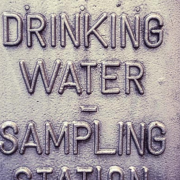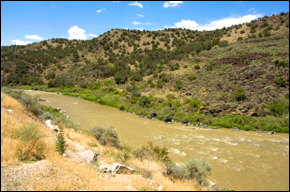Keith Schneider: Water Not Mixed into Barcelona Climate Talks
 Circle of Blue’s Senior Editor Keith Schneider breaks down the U.N. Barcelona climate conference with day one leaving us to question, “Where’s the water?”
Circle of Blue’s Senior Editor Keith Schneider breaks down the U.N. Barcelona climate conference with day one leaving us to question, “Where’s the water?”
BARCELONA (November 3, 2009) — On Monday, at the latest global negotiation on a new treaty to cool the planet and heat up global economies, thousands of delegates and public interest advocates convened in the huge and noisy conference rooms at the front of Barcelona’s Fira Gran Via conference center.
But in the rear of the cavernous building, deep in its bowels, just a handful of people sat in the encompassing quiet of the Tejo room to listen to 27-year-old Hannah Stoddart. Stoddart was explaining how she and several colleagues at the Global Public Policy Network are readying an international campaign that pushes the freshwater crisis to the forefront of United Nations-managed climate negotiations.
With a meager audience before her, Stoddart acknowledged she has a long way to go. The meeting on Monday afternoon served as a curtain raiser to Water Day, a day-long conference on Tuesday that Stoddart helped to organize in a neighboring hotel. The event’s intent is to “show that water is a critical and cross-cutting concern for climate change adaptation and mitigation,” according to the conference organizers. Ultimately they are trying to convince global climate negotiators to re-evaluate their objectives and put water crisis solutions at the center.
For the time being, that objective has no hope of being realized. The Barcelona negotiations, the last in the build-up to Copenhagen, are already beset by complex, unresolved issues of politics, science, ideology and economics. As a result the fate of Kyoto’s successor is not yet secure.
The steady tick, tick, tick of the deadline clock permeates every meeting room.
Stoddart, a tall and slim English public policy specialist, says she’s okay with that – you have to start somewhere.
Partnering with the Stakeholder Forum for a Sustainable Future and the Stockholm International Water Institute (SIWI), which oversees the annual summertime World Water Week, Stoddart is taking some of the first steps to putting the water crisis front and center in the climate crisis debates.
They have evidence and consequences that are raw and immediate on their side.
Because of climate change droughts are becoming deeper and longer, scientists say. Flooding is more dire. Two billion people are experiencing diminishing access to clean water, while millions are dying each year from the growing incidence of water-borne diseases – which are often solvable with improved sanitation and modern infrastructure.
Meanwhile the competition for water between farmers and teeming cities is increasing. Some of the world’s greatest lakes – among them Africa’s Lake Chad – are literally drying up. And the great icy reservoirs of the Himalayas, which supply the snowmelt that recharges Asian rivers used by 750 million people, are steadily melting away. Each of these examples are cited by climate negotiators as reason to speed a new treaty to completion.
“Water is the main transmitter of climate change effects on humans and the environment,” Stoddart said.
To a large extent the links between the water and climate crises have helped to move both to the forefront of other globally significant gatherings, including the World Economic Forum, the Clinton Global Initiative, the Aspen Ideas Festival and World Water Week. The U.N. also supports a deep bench of research and delivery programs to help people around the world reckon with dwindling supplies of freshwater.
Still, the water crisis is not on the table for climate negotiations and has never been there.
The political and administrative impediments to reaching that goal are high, said Stoddart. Just as in solving the climate crisis, the water crisis involves reaching across national boundaries to improve conservation, better manager surface supplies and groundwater, and encourage rich nations to assist poor nations in financing, and building new infrastructure. The U.N. is holding back on tackling another transboundary tangle while the climate negotiations are under way, Stoddart said.
“Water is a new issue,” she said, “and it exists in a crowded political agenda.”
Follow Circle of Blue’s Barcelona climate coverage all week and stay tuned for our upcoming Water + Climate series.
Circle of Blue’s senior editor and chief correspondent based in Traverse City, Michigan. He has reported on the contest for energy, food, and water in the era of climate change from six continents. Contact
Keith Schneider











Talk on climate change by ignorning water issues is meaningless, because, it is water which determines the fate of climate change & vice-versa. If hydrogeological cycles be maintained , then, no body would notice the climate change. as such, water & its related issues should must be addressed in depth, if the summit on climate change is to be made purposeful.
Dr.C.B.sharma,
Water Scientist, India
We as a company have cheap simple and patented technology that saves both water and energy.
Here in the UK we are having terrible trouble finding Goverment agencies willing to be proactive.
It seems that the rhetoric is enough.